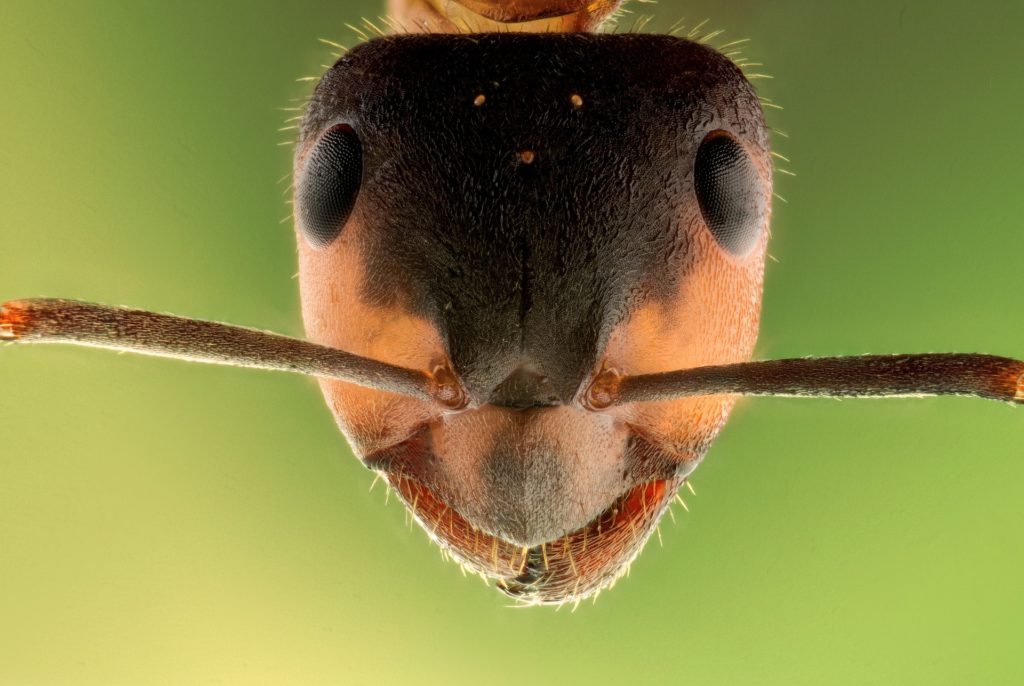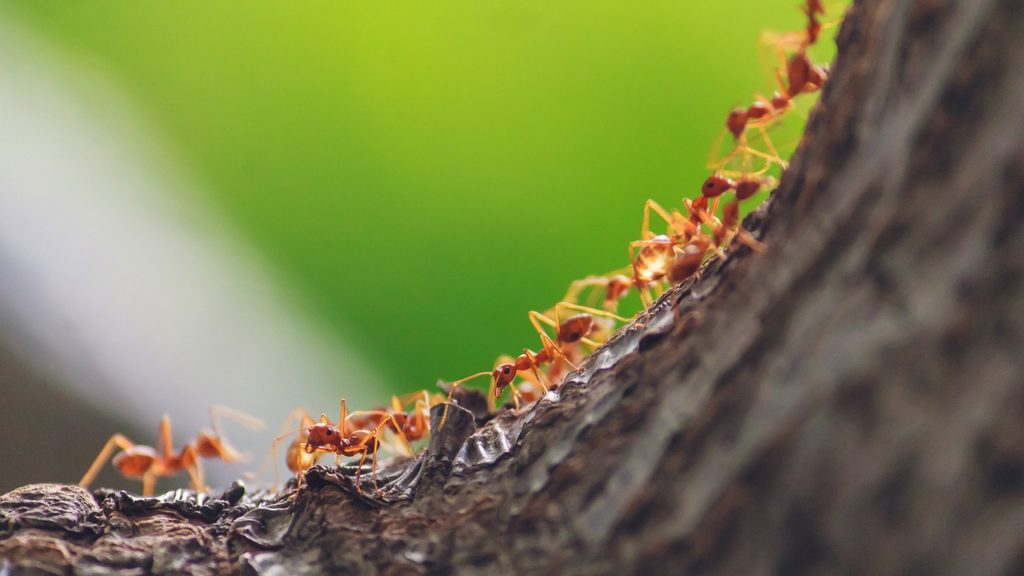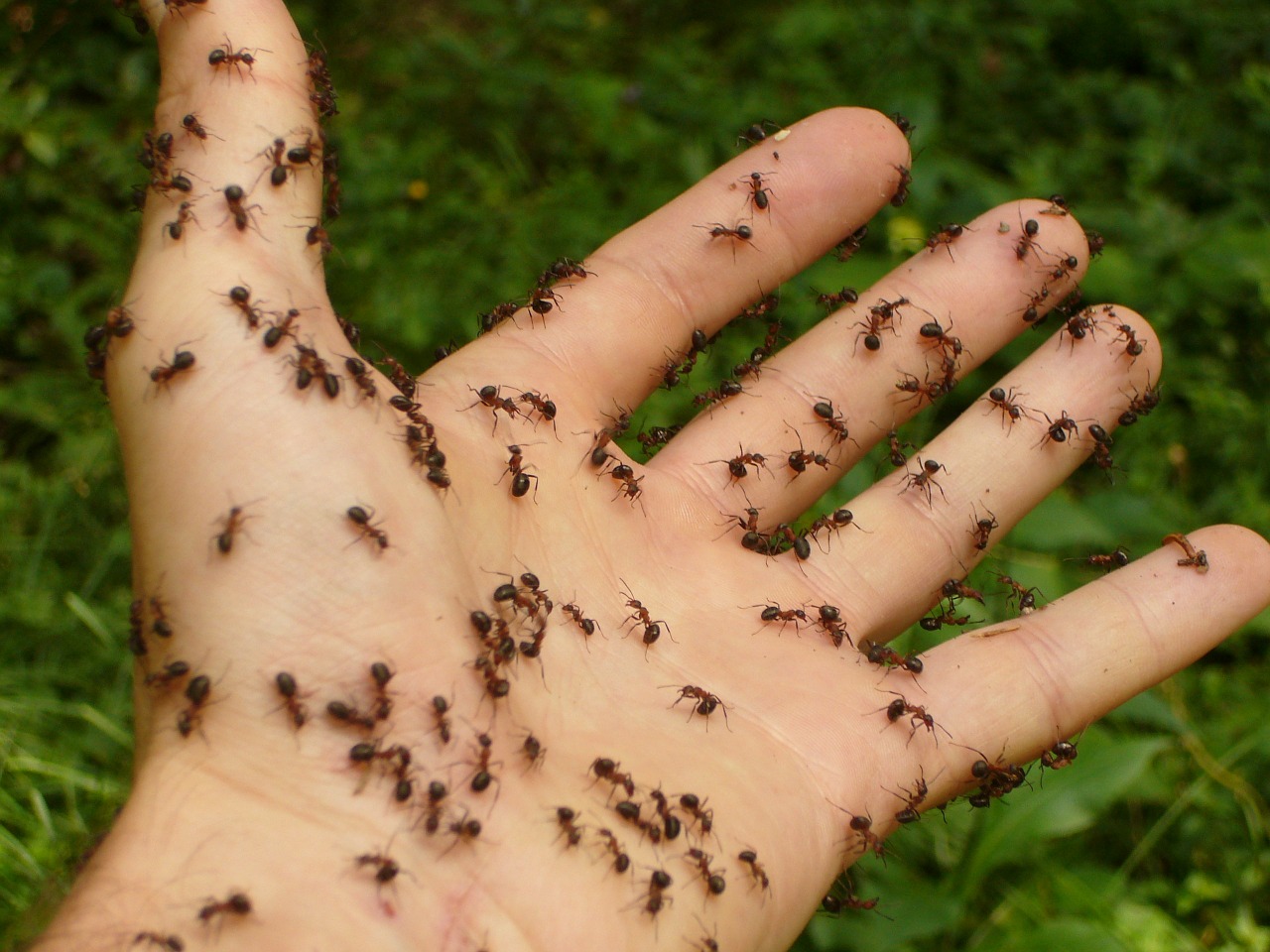If you are dealing with ants, it’s important to know how ants protect themselves. If you know their defensive capabilities and traits, you can take advantage of them for your ant control methods. This makes it easier to get rid of ants. So, how do ants protect themselves?
Here is how ants protect themselves…
1. Ants protect themselves using pheromones
Do you ever wonder why you almost always see ants in a trail? They always seem to march from their nest to the food source in long ant trails on your walls. Ant trails form because when an ant finds a food source, it leaves behind a trail of pheromones. This way, the other ants in the colony will be able to follow it and collect the food in the designated location. All the ants will then release pheromones to strengthen the chemicals in the trail.
One of the primary ways of communication between ants is pheromones. They use these chemicals not just to communicate food sources, but also to coordinate attacks and defenses. When you are trying to get rid of ants, you can mask the scent of pheromones to disrupt the communication channels of these pests.
You can do this by using strong odors such as vinegar. Many people use vinegar on ant trails, so ants have a hard time getting resources. You can also use vinegar on their ant nest to prevent them from communicating and coordinating a defense.
2. Ants have strong bodies that help protect them
The bodies of ants also have a lot of defensive features. Their very exoskeletons make them fortresses. Predators may find it difficult to penetrate them to deal a fatal blow. Ants also have strong mandibles. They don’t just use these for communication. They also use them for defense. Their mandibles can bite and pinch predators and other potential threats, including humans.
Some ant species, particularly fire ants, also have stingers. These stingers inject venom into threatening enemies, causing pain and allergic reactions. Humans can be victims here too. And severe allergic reactions can even be fatal.
You should consider these features when trying to control ants in your home. For instance, there are formulations of insecticides out there that can penetrate through the strong exoskeletons of ants. If traps are your thing, there are ant bait stations out there that take advantage of ant mandibles to capture ants but prevent them from escaping.

3. Ants protect themselves with defensive secretions
Ants use pheromones to communicate with other ants in the colony about a nearby attack or danger. And then the ants can respond accordingly and coordinate a counterattack or defense. Some ants also have defensive secretions. For instance, fire ants use stingers and venom glands that contain alkaloids, giving the venom a burning sensation. This burning sensation is the reason why they are called fire ants in the first place. Bullet ants, on the other hand, have venom with neurotoxic peptides, causing pain and swelling to their victims.
There is no foolproof way to take advantage of these secretions. The best thing you can do is to be aware of them. This way, you minimize the risk of getting bitten or stung by these defensive ants. When controlling ants, especially fire ants and other species with defensive secretions, make sure to cover yourself. Use long-sleeved shirts, pants, boots, gloves, and face masks to protect yourself from bites and stings.
4. Ants build their nests in defensive locations
Ants build their nests in locations where they can be safe against predators and disturbances. This means that their nests are almost always in hard-to-reach areas, such as underground or within your walls. They can also nest in cracks, gaps, windows, voids, and other structural features where they can be safe and have easy access to the food inside your home.
This is crucial information, especially if you can’t find the ant nest troubling your home. Now you can find the ant nest by looking at these areas. Focus your pest control methods on these areas. And when the ants are gone, you can also focus your ant prevention on these areas to avoid another infestation.
5. Ants have a social structure to organize roles
Ants have a complex social hierarchy. They have different roles within their colony. Of course, there is the queen, responsible for laying eggs and sustaining the population. You have the workers, the backbone of foraging and nest maintenance. And then you have the soldiers, physically superior ants in charge of defense. This social order makes ant nests colonies formidable, as the ants organize themselves in specific roles for maximum productivity.
You can disrupt this social order to prevent ants from thriving too well on your property. A great target will be the ant queen. Without the queen, you will be able to disrupt the reproductive cycle of the colony. And eventually, you may be able to see its decline.
The best way to get rid of the ant queen is with ant baits. Ant baits are toxic to ants, and they think that they are food, so they bring them home. When the queen ends up eating the baits, she can die, which is a serious handicap to the colony.

6. Ants are highly adaptable
The difficulty of ant control is not always about how ants protect themselves. Sometimes, it’s about how ants are highly adaptive. They can survive and thrive pretty much anywhere. This can be very difficult if you are trying to get rid of them. But you can attack them where it will hurt the most — their food source.
Ants are masters of foraging. They can scout for the tiniest food crumbs and the smallest water droplets in their nest’s vicinity. They can also alter their foraging routes and trails and even change nest locations to avoid certain dangers. But they won’t truly thrive if you deprive them of food.
Always clean up after eating. Wash the dishes immediately and wipe all surfaces. Keep garbage cans closed and regularly empty them. And don’t let insects thrive on your property because ants can eat them too.
Take advantage of how ants protect themselves
Ants have defensive capabilities and traits that can make them resilient household pests. It’s important to know how ants protect themselves because you can take advantage of this knowledge for a more focused pest control method. You just have to do more research about the particular pest control methods that disrupt these defenses, such as how ant baits are great for killing ant queens and disrupting the social hierarchy of ants.
However, this can get complicated very quickly. Many times, only pest control professionals are able to take advantage of these defensive capabilities and traits. If you think you can’t handle the ants on your own, don’t hesitate to call pest control professionals.

